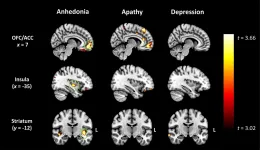Exercise benefit in breast cancer linked to improved immune responses
Tumors grew more slowly and responded better to immunotherapy in mice that exercised compared with sedentary mice.
2021-04-12
(Press-News.org) BOSTON - Exercise training may slow tumor growth and improve outcomes for females with breast cancer - especially those treated with immunotherapy drugs - by stimulating naturally occurring immune mechanisms, researchers at Massachusetts General Hospital (MGH) and Harvard Medical School (HMS) have found.
Tumors in mouse models of human breast cancer grew more slowly in mice put through their paces in a structured aerobic exercise program than in sedentary mice, and the tumors in exercised mice exhibited an increased anti-tumor immune response.
"The most exciting finding was that exercise training brought into tumors immune cells capable of killing cancer cells known as cytotoxic T lymphocytes (CD8+ T cells) and activated them. With more of these cells, tumors grew more slowly in mice that performed exercise training," says co-corresponding author Dai Fukumura, MD, PhD, deputy director of the Edwin L. Steele Laboratories in the Department of Radiation Oncology at MGH.
As Fukumura and colleagues report in the journal Cancer Immunology Research
, the beneficial effects of exercise training are dependent on CD8+ T cells; when the researchers depleted these cells in mice, tumors in mice that exercised no longer grew at a slower rate.
They also found evidence that recruitment of CD8+ T cells to tumors was dependent on two chemical recruiters (chemokines) labeled CXCL9 and CXCL11. Levels of these chemokines were increased in mice that exercised, and mice that were genetically engineered to lack the receptor (docking site) for these chemokines did not recruit CD8+ T cells and did not have an anti-tumor benefit.
"Humans whose tumors have higher levels of CD8+ T cells tend to have a better prognosis, respond better to treatment, and have reduced risk of cancer recurrence compared with patients whose tumors have lower levels of the immune cells, effects that were echoed by a reduced incidence of metastasis, or spread, of the cancers in mice that exercised," says co-corresponding author Rakesh K. Jain, PhD, director of the Steele Labs at MGH and Andrew Werk Cook Professor of Radiation Oncology at HMS.
CD8+ T cells are also essential for the success of drugs known as immune checkpoint inhibitors, such as Keytruda (pembrolizumab), Opdivo (nivolumab) and Yervoy (ipilimumab), which have revolutionized therapy for many types of cancer, but have to date had only limited success in breast cancer. The researchers found that exercise-trained mice displayed a much better response to immune checkpoint blockade, while the drugs did not work at all in sedentary mice.
"We showed that daily sessions of a moderate-to-vigorous intensity, continuous aerobic exercise training, lasting 30-45 minutes per session, induces a profound reprogramming of the tumor microenvironment that rewires tumor immunity, recruiting and activating CD8+ T cells to an unprecedented level with a non-pharmacological approach. Similar exercise training could be prescribed to a patient referred to an exercise oncology program," says Igor L. Gomes-Santos, PhD, lead author and exercise physiologist and post-doctoral fellow in the Steele Labs.
He notes that current clinical guidelines focus on general wellness, improved fitness levels and quality of life, but not necessarily on improved cancer treatment, especially immunotherapy, and that this lack of evidence limits its application in clinical practice.
More convincing, mechanism-based data are needed to motivate oncologists to discuss exercise training with their patients, to motivate patients to become more active and to expand implementation of outpatient exercise oncology programs, the investigators say.
INFORMATION:
The work was supported by grants from the National Institutes of Health to Fukumura and Jain as well as the National Foundation for Cancer Research, Harvard Ludwig Cancer Center, Advanced Medical Research Foundation and Jane's Trust Foundation to Jain and a fellowship from the Sao Paulo Research Foundation (Brazil) for Gomes-Santos.
About the Massachusetts General Hospital
Massachusetts General Hospital, founded in 1811, is the original and largest teaching hospital of Harvard Medical School. The Mass General Research Institute conducts the largest hospital-based research program in the nation, with annual research operations of more than $1 billion and comprises more than 9,500 researchers working across more than 30 institutes, centers and departments. In August 2020, Mass General was named #6 in the U.S. News & World Report list of "America's Best Hospitals."
ELSE PRESS RELEASES FROM THIS DATE:
2021-04-12
Philadelphia, April 12, 2021 - Electronic cigarette (EC) use, or vaping, has both gained incredible popularity and generated tremendous controversy, but although they may be less harmful than tobacco cigarettes (TCs), they have major potential risks that may be underestimated by health authorities, the public, and medical professionals. Two cardiovascular specialists review the latest scientific studies on the cardiovascular effects of cigarette smoking versus ECs in the Canadian Journal of Cardiology, published by Elsevier. They conclude that young non-smokers should be discouraged from vaping, flavors targeted towards adolescents should be banned, and laws and regulations ...
2021-04-12
What exactly happens when the corona virus SARS-CoV-2 infects a cell? In an article published in Nature, a team from the Technical University of Munich (TUM) and the Max Planck Institute of Biochemistry paints a comprehensive picture of the viral infection process. For the first time, the interaction between the coronavirus and a cell is documented at five distinct proteomics levels during viral infection. This knowledge will help to gain a better understanding of the virus and find potential starting points for therapies.
When a virus enters a cell, viral and cellular protein molecules begin to interact. Both the replication of the virus and the reaction of ...
2021-04-12
PHILADELPHIA - Residents in majority-Black neighborhoods experience higher rates of severe pregnancy-related health problems than those living in predominantly-white areas, according to a new study of pregnancies at a Philadelphia-based health system, which was led by researchers in the Perelman School of Medicine at the University of Pennsylvania. The findings, published today in Obstetrics and Gynecology, suggest that neighborhood-level public health interventions may be necessary in order to lower the rates of severe maternal morbidity -- such as a heart attack, heart failure, eclampsia, or hysterectomy -- and mortality ...
2021-04-12
April 12, 2021 - For critically ill COVID-19 patients treated with extracorporeal membrane oxygenation (ECMO), the risk of death remains high - but is much lower than suggested by initial studies, according to a report published today by Annals of Surgery. The journal is published in the Lippincott portfolio by Wolters Kluwer.
The findings support the use of ECMO as "salvage therapy" for COVID-19 patients with acute respiratory distress syndrome (ARDS) or respiratory failure who do not improve with conventional mechanical ventilatory support, according to the new research by Ninh T. Nguyen, MD, Chair of the Department of Surgery, University ...
2021-04-12
New research by Yale Cancer Center shows patients with early-onset colorectal cancer, age 50 and younger, have a better survival rate than patients diagnosed with the disease later in life. The study was presented virtually today at the American Association of Cancer Research (AACR) annual meeting.
"Although small, we were surprised by our findings," said En Cheng, MD, MSPH, lead author of the study from Yale Cancer Center. "Past studies have shown younger colorectal patients, those under 50, were reported to experience worse survival compared with patients diagnosed at older ages. We hope this result can be inspiring for these ...
2021-04-12
In a new study led by Yale Cancer Center, researchers have advanced a tumor-targeting and cell penetrating antibody that can deliver payloads to stimulate an immune response to help treat melanoma. The study was presented today at the American Association of Cancer Research (AACR) virtual annual meeting.
"Most approaches rely on direct injection into tumors of ribonucleic acids (RNAs) or other molecules to boost the immune response, but this is not practical in the clinic, especially for patients with advanced cancer," said Peter M. Glazer, MD, PhD, Chair of the Department of Therapeutic Radiology ...
2021-04-12
New research from CU Cancer Center member Scott Cramer, PhD, and his colleagues could help in the treatment of men with certain aggressive types of prostate cancer.
Published this week in the journal Molecular Cancer Research, Cramer's study specifically looks at how the loss of two specific prostate tumor-suppressing genes -- MAP3K7 and CHD1 --increases androgen receptor signaling and makes the patient more resistant to the anti-androgen therapy that is typically administered to reduce testosterone levels in prostate cancer patients.
"Doctors don't normally stratify patients based on this subtype and say, 'We're going to have to treat these people differently,' but we think this should be considered before treating ...
2021-04-12
KEY POINTS:
- Loss of pleasure has been revealed as a key feature in early-onset dementia (FTD), in contrast to Alzheimer's disease.
- Scans showed grey matter deterioration in the so-called pleasure system of the brain.
- These regions were distinct from those implicated in depression or apathy - suggesting a possible treatment target.
People with early-onset dementia are often mistaken for having depression and now Australian research has discovered the cause: a profound loss of ability to experience pleasure - for example a delicious meal or beautiful sunset - related to degeneration of 'hedonic hotspots' in the brain where pleasure mechanisms are concentrated.
The University of Sydney-led ...
2021-04-12
While the new Coronavirus will, hopefully, be effectively controlled sooner rather than later, its latest namesake is here to stay - a small caddisfly endemic to a national park in Kosovo that is new to science.
Potamophylax coronavirus was collected near a stream in the Bjeshkët e Nemuna National Park in Kosovo by a team of scientists, led by Professor Halil Ibrahimi of the University of Prishtina. After molecular and morphological analyses, it was described as a caddisfly species, new to science in the open-access, peer-reviewed Biodiversity Data Journal.
Ironically, the study of this new insect was impacted by the same pandemic that inspired its scientific name. Although it was collected a few years ago, the new species was only described during the global pandemic, ...
2021-04-12
New research shows that people who experience big dips in blood sugar levels, several hours after eating, end up feeling hungrier and consuming hundreds more calories during the day than others.
A study published today in Nature Metabolism, from PREDICT, the largest ongoing nutritional research program in the world that looks at responses to food in real life settings, the research team from King's College London and health science company ZOE (including scientists from Harvard Medical School, Harvard T.H. Chan School of Public Health, Massachusetts General Hospital, the University of Nottingham, Leeds University, and Lund University ...
LAST 30 PRESS RELEASES:
[Press-News.org] Exercise benefit in breast cancer linked to improved immune responses
Tumors grew more slowly and responded better to immunotherapy in mice that exercised compared with sedentary mice.



